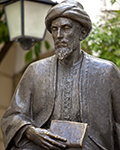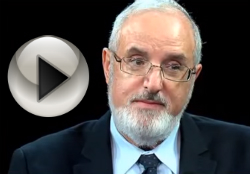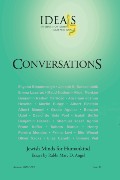On Shabbat morning, July 19, Rabbi Hayyim Angel will give a class at Congregation Netivot Shalom in Teaneck, New Jersey.
The talk is entitled, "Yirmiyahu 1:1-2:3: Insights into the Haftarah We Just Read."
Free and open to the public. Services begin at 9:00 am, and the talk will be at the conclusion of services.

Welcome to the Institute for Jewish Ideas & Ideals
The Institute for Jewish Ideas and Ideals offers a vision of Orthodox Judaism that is intellectually sound, spiritually compelling, and emotionally satisfying. Based on an unwavering commitment to the Torah tradition and to the Jewish people, it fosters an appreciation of legitimate diversity within Orthodoxy.
YouTube

Rabbi Marc D. Angel answers your questions on our YouTube channel!
The IDEAS Campaign

Please support our IDEAS campaign and be our partners in creating a dynamic and compassionate Orthodoxy. Contribute now! Supporters are featured on our online Scroll of Honor.
Conversations

Find out more about Conversations, the Institute's print journal, including how to get your copy. You can also review our Article Title or Author index.
The book of Eicha (Lamentations) is Jeremiah's eyewitness response to the destruction of the Temple in Jerusalem and the accompanying tragedies that befell the Jewish People.In this article, Rabbi Hayyim Angel elucidates the meaning of this poignant biblical book.
We can fight “echo reasoning” by insisting on independent reasoning. We can fight autocracy by insisting on freedom of expression. We can combat religious rigidity and intolerance by raising our voices for intellectual vibrancy, compassion and social responsibility.
When I recite the Kaddish deRabbanan these days, I feel a certain unease. I am troubled by the fact that not all rabbis and students of Torah are people who I find admirable or worthy of praise. There are those who study Torah but who act reprehensibly or say terrible things.
The account of Balak and Bil'am (Numbers 22-24) presents, in the form of a story, the great ethical and spiritual insights at the root of Judaism, as relevant today as it was when Abraham and Sarah first taught “the way of God, which is to do tzedakah and mishpat” (Genesis 18:19).
In this article, Dr. Zvi Zohar presents and analyzes concepts of Galut and of the modern Return to Zion found in a seminal responsum composed by Rabbi Ya’akov Moshe Toledano (1880–1960). Born in Tiberias, scion of an illustrious Sephardic family in Meknès, Rabbi Toledano served as Sephardic Chief Rabbi of Tel Aviv from 1942 until his death.








